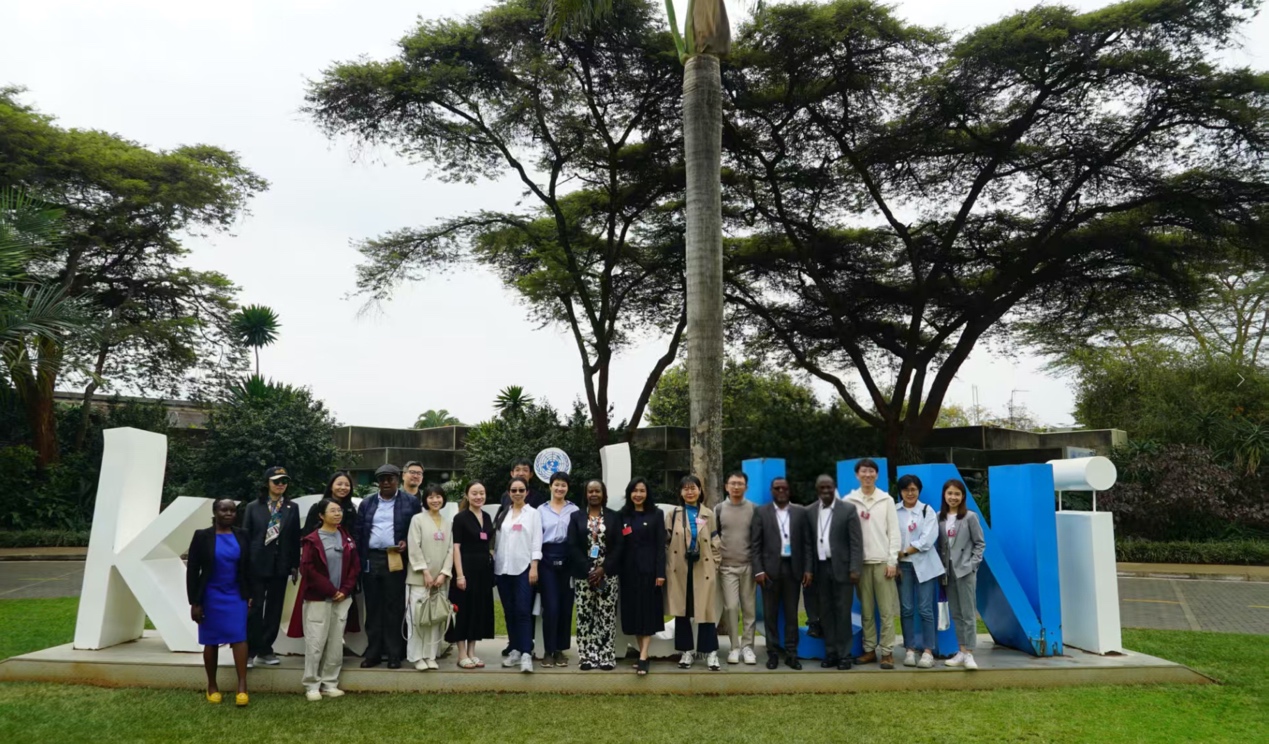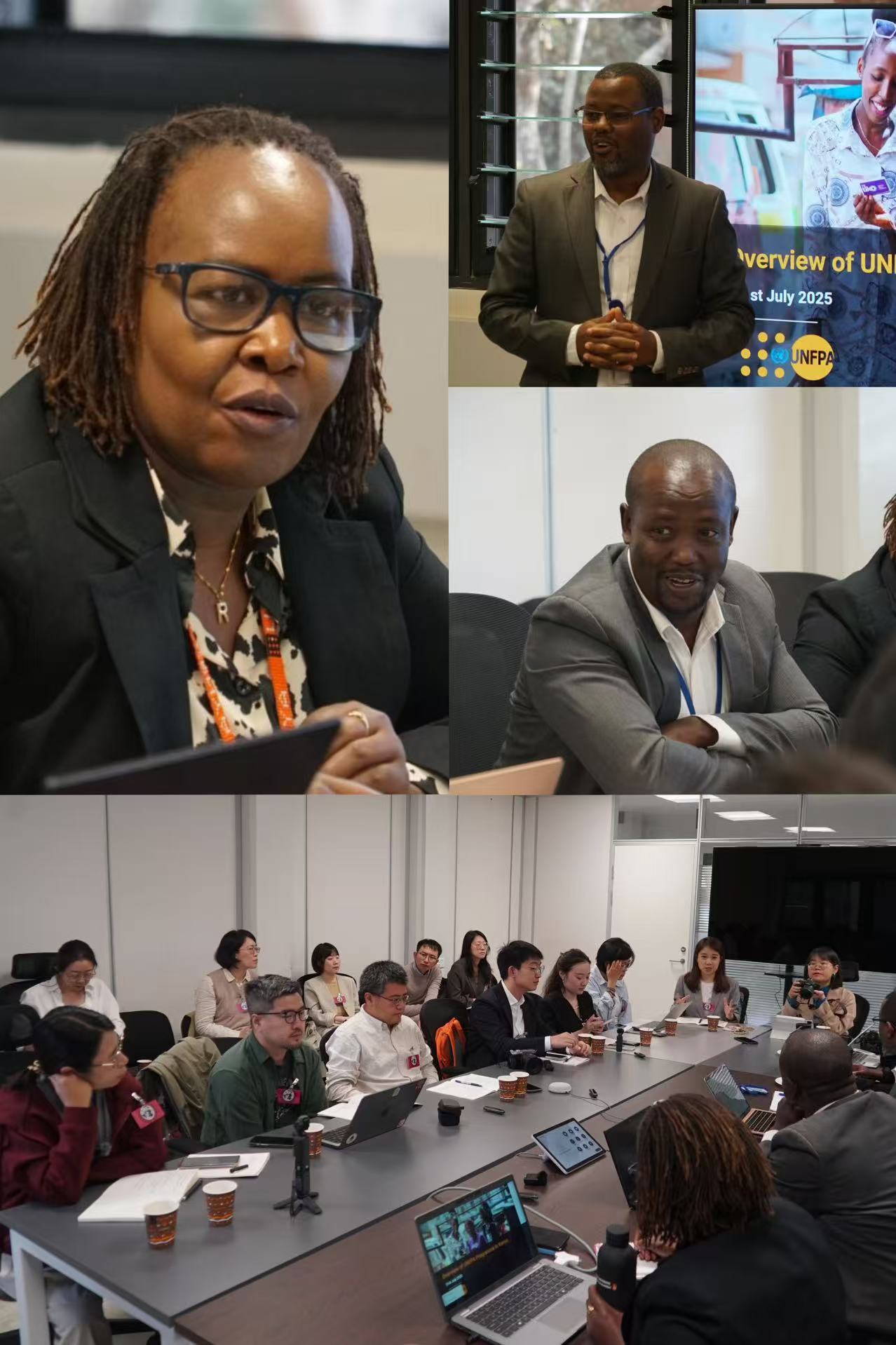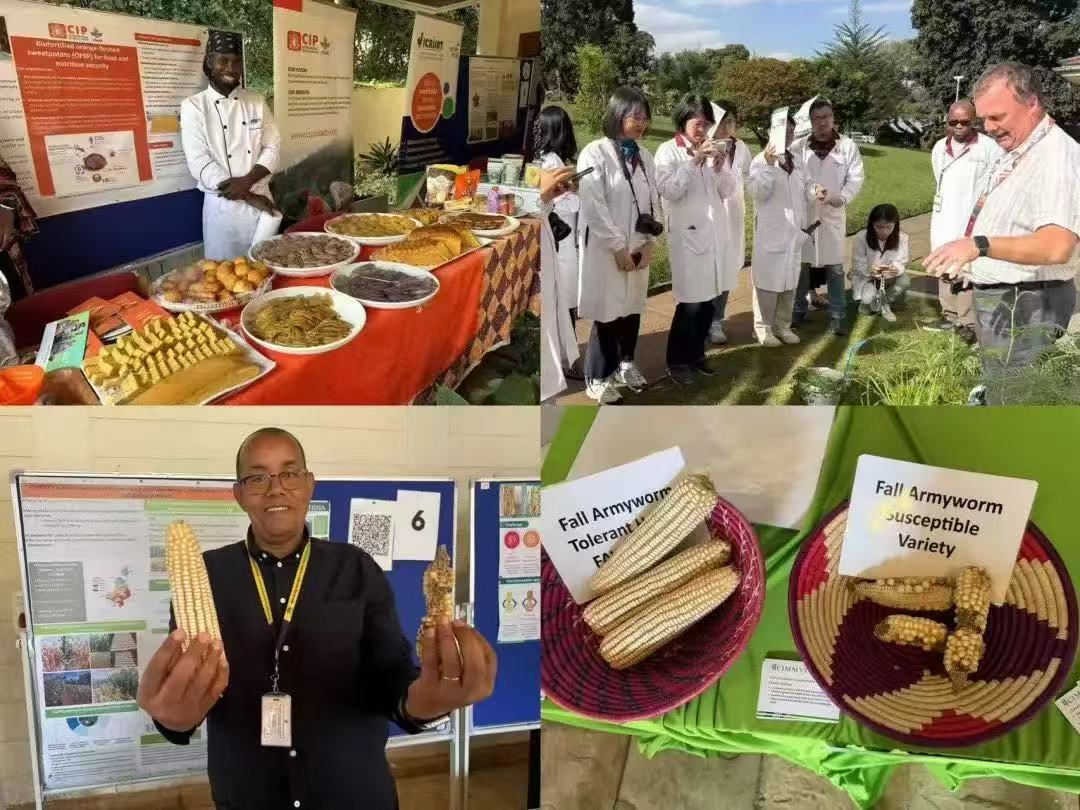From July 28 to August 1, 2025, the Global Development and Health Communication Center (GDHCC) of Tsinghua University’s School of Journalism and Communication led a media delegation to Nairobi, Kenya, to investigate frontline challenges in global health and sustainable development amid shrinking global funding. The 11-member team, composed of senior journalists from Xinhua News Agency, China Media Group, Caixin Media, and other outlets, visited major international and local institutions, gaining first-hand insights into health initiatives, agricultural innovation, and China-Africa cooperation.

The delegation poses for a group photo with officials from the United Nations Population Fund (UNFPA) and the United Nations Information Centre (UNIC) at the UN Compound in Nairobi, Kenya.
Exploring Global Fund-Supported Health Projects
On July 28–29, delegates visited a range of Global Fund–supported sites, including community health centers in Kibera and Mathare, referral hospitals in Machakos and Naivasha, and several programs implemented by the Kenya Red Cross Society (KRCS) — namely HOPE Worldwide Kenya, the Support for Addictions Prevention and Treatment in Africa (SAPTA) harm-reduction program, and the Bar Hostess Empowerment and Support Program (BHESP). The visit also covered the Kenya Medical Research Institute (KEMRI) entomology laboratories and the national medical warehouse operated by the Kenya Medical Supplies Authority (KEMSA).
Through discussions with health officials, community volunteers, and patients, delegates observed HIV, tuberculosis, and malaria prevention efforts from funding allocation to last-mile service delivery. The visits highlighted the challenges posed by reduced global health financing and reinforced the importance of multilateral cooperation in sustaining public health outcomes in Africa.
Strengthening Health Systems : Gates Foundation Kenya Office
On the afternoon of July 29, the delegation visited the Gates Foundation’s Kenya office for a roundtable discussion with Dr. Paulin Basinga, Africa Director of the Gates Foundation. The dialogue explored the challenges that reduced global health funding poses to Africa’s health sector, the implications of rapid population growth and rising disease burden, and the need for technological and institutional innovations to strengthen capacity building and health system resilience across the continent.
Dr. Basinga noted that in recent years, global health resources have tightened, and in the context of fast-growing populations and increasing disease pressure, Africa urgently needs to bolster its health systems through innovation. He underscored three priorities for enhancing system capacity—data, human resources, and supply chains—and discussed with the delegation the potential for China-Africa collaboration in these areas as well as the significant role China can play on multilateral platforms.
Adolescent Health and Digital Solutions: Amref International University
On July 30 morning, delegates exchanged with Amref International University to examine research and interventions in adolescent reproductive health. Presentations included the “BRIGHT” study and the “Leap” mobile app, designed to prevent teen pregnancy and support early maternal care. Delegates engaged directly with community health workers and young mothers, gaining practical insights into digital health tools in local communities.
Amref International University also highlighted its historical ties with China, showcasing valuable archival materials and screening a short documentary produced in collaboration with Tsinghua University.
Chinese Medical Technology in Kenya: Edan Kenya
On July 30 afternoon, the delegation visited the Kenyan branch of Edan, a Chinese medical equipment company. Representatives from the company provided an overview of its global development and technological achievements in multi-parameter monitoring, ultrasound imaging, and maternal and child health. The East Africa team highlighted local operations, including market entry, regulatory approvals, team building, and partner networks, emphasizing how training, technical support, and after-sales services strengthen healthcare capacity in Kenya. Kenyan clinical and technical professionals shared case studies showing the application of the company’s products in primary hospitals, obstetric care, and emergency systems. Kenyan local partners also highlighted the positive impact of collaboration, illustrating how Chinese medical technology contributes to healthcare access and system resilience.
Women, Children, and Funding Gaps: UNFPA Nairobi
On the morning of July 31, the delegation visited the UN Compound in Nairobi and met with UNFPA. The team briefed delegates on their work in reproductive health, women’s empowerment, and child protection, highlighting the challenges posed by tightening global health funding. The discussion also covered UNFPA Kenya’s achievements, future priorities, and collaboration with China, emphasizing the crucial role of international cooperation in addressing health challenges in developing countries. Delegates engaged in a Q&A on women’s and adolescent health, sustainable financing, and project impact.
In a separate session, the delegation met with the UN Information Center to discuss international communication collaboration and explore how Chinese media can contribute to shaping the global development narrative.

UNFPA representatives hold discussions with the delegation
Agricultural Innovation and Food Security: CGIAR and ILRI
On the afternoon of July 31, the delegation visited the International Livestock Research Institute (ILRI) in Nairobi under CGIAR to explore challenges and technological solutions for food security, livestock production, and fisheries in the context of climate change. ILRI and CGIAR leadership welcomed the delegates and highlighted prospects for China-Africa collaboration in improving animal health, farmer livelihoods, and ecological sustainability. They also emphasized CGIAR’s critical role in advancing global food and nutrition security and the long-term impact of investing in agricultural research, while noting the media’s responsibility in science communication and combating misinformation.
Delegates toured ILRI laboratories and the “Science Safari” exhibition, learning about innovations such as AI pest monitoring, vitamin A-enriched sweet potatoes, “forgotten crops,” and drought-resistant maize and wheat.

Researchers at the ILRI laboratory brief the delegation on agricultural research projects involving rice, potatoes, and other crops
This media learning trip provided Chinese media with a comprehensive understanding of African public health, agricultural innovation, and international cooperation. By combining on-site visits, expert discussions, and community engagement, the delegation strengthened platforms for China-Africa dialogue and knowledge sharing, demonstrating GDHCC’s commitment to “promote global health and development through communication.”

